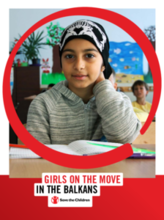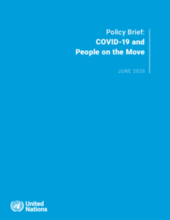Displaying 211 - 220 of 839
This integrative literature review studies well‐being of unaccompanied asylum‐seeking children through the three modes of recognition—love, rights and solidarity—as conceptualized by Axel Honneth.
This report from Save the Children presents a qualitative study with the participation of girls and young women who are in transit or have migrated to Greece, Serbia and Bosnia and Herzegovina.
This Policy Brief offers four basic tenets to guide our collective response to human mobility and the COVID-19 crisis, including the response to children on the move and children who are separated or unaccompanied in particular.
This study explores how sub-Saharan African migrant parents and caregivers navigate parenting between the cultures that have shaped their lives and parenting expectations within the new environment.
For this study, the researchers interviewed unaccompanied minor refugees (UMRs) in two youth asylum-centres in rural Sweden.
This study explored the independent effects of left-behind experience (LBE) on self-esteem and aggressive behavior in Chinese young adult populations, or the interaction effects of LBE and self-esteem on aggressive behavior.
The aim of this study was to investigate the prevalence of depression, anxiety, and resilience in Eritrean unaccompanied refugee minors living with foster parents in Sudan.
The purpose of this study was to capture the association of exposure to prolonged separation from both parents early in life and allostatic load (AL), a measure of biological multi-system dysregulation.
This article from the World Economic Forum describes the impact of the COVID-19 crisis on children in immigration detention in the United States and calls on the US government to take immediate actions to stop the violence against migrant children and families and to protect them from the impacts of the COVID-19 pandemic.
The current study used a longitudinal design to explore how perceived discrimination is associated with psychosocial functioning (i.e., depressive symptoms and social initiative) over time in Chinese rural left-behind adolescents.


